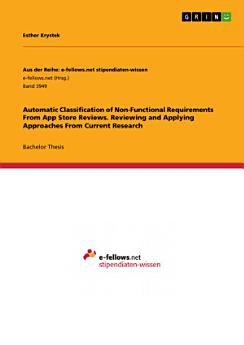Automatic Classification of Non-Functional Requirements From App Store Reviews. Reviewing and Applying Approaches From Current Research
Esther Krystek
září 2021 · Aus der Reihe: e-fellows.net stipendiaten-wissen Kniha 3949 · GRIN Verlag
E‑kniha
33
Stránky
family_home
Vhodná
info
reportHodnocení a recenze nejsou ověřeny Další informace
Podrobnosti o e‑knize
Bachelor Thesis from the year 2021 in the subject Business economics - Miscellaneous, grade: 1,3, University of Mannheim, language: English, abstract: The thesis addresses a part of the requirements engineering process (RE), namely the treatment of non-functional requirements. Requirements are commonly divided into functional requirements (FRs) and non-functional requirements (NFRs). NFRs address the non-functional aspects of a system, for example, its user interface. The thesis lays the theoretical background and explores the general nature of NFRs including different taxonomies of NFRs. It then looks closely at NFRs in the context of mobile applications. In their marketplaces, so-called App Stores, users can express their opinion about an app after downloading and using it. Software developers can collect requirements straight from these reviews. This can help them improve their software to meet users' expectations. Due to the vast amount of review data manual inspection is tedious, time-consuming, cumbersome, or even infeasible. Tools to automatically classify such reviews might aid with this problem. However, there is still no solution to automatically extract NFRs from app store reviews and classify them into different types in practice. The thesis, therefore, assesses the current state of research in developing automated solutions to classify NFRs from app store reviews. It analyzes several past approaches to automatically classify NFRs from app store reviews using machine learning and looks at the performance of different algorithms used for these approaches. It states that the so-called Support Vector Machine (SVM) algorithm performed best in the settings analyzed. The second practical part of the thesis then applies this SVM algorithm onto a given dataset with labeled reviews using Python. The reviews are classified into either one of these categories or no category at all: Usability, Dependability, Performance, and Supportability.
Ohodnotit e‑knihu
Sdělte nám, co si myslíte.
Informace o čtení
Telefony a tablety
Nainstalujte si aplikaci Knihy Google Play pro Android a iPad/iPhone. Aplikace se automaticky synchronizuje s vaším účtem a umožní vám číst v režimu online nebo offline, ať jste kdekoliv.
Notebooky a počítače
Audioknihy zakoupené na Google Play můžete poslouchat pomocí webového prohlížeče v počítači.
Čtečky a další zařízení
Pokud chcete číst knihy ve čtečkách elektronických knih, jako např. Kobo, je třeba soubor stáhnout a přenést do zařízení. Při přenášení souborů do podporovaných čteček elektronických knih postupujte podle podrobných pokynů v centru nápovědy.








